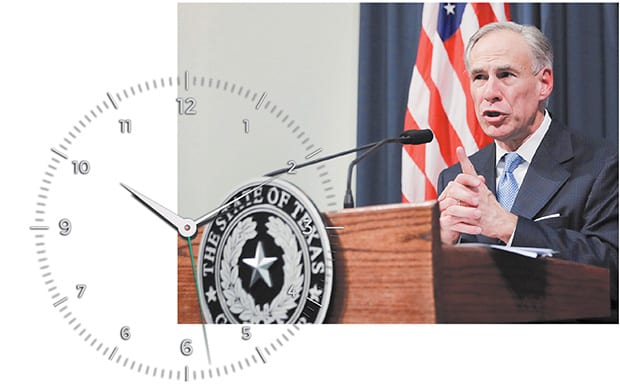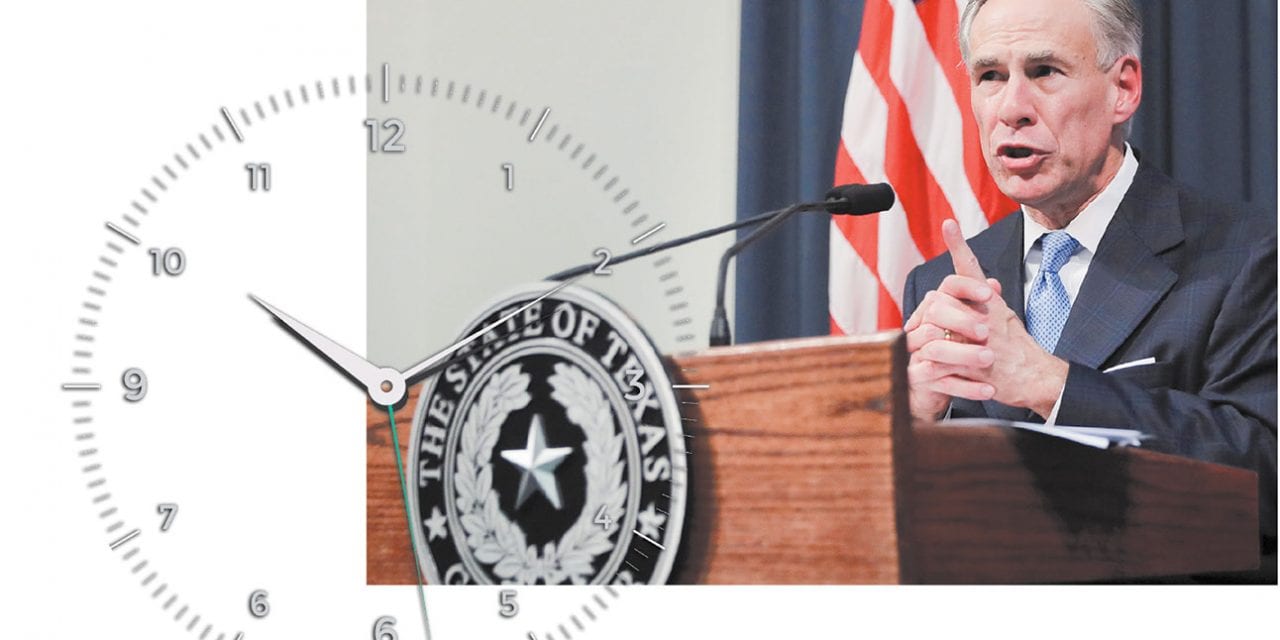Special session has one priority, but bathroom bill looms on Abbott’s agenda

JAMES RUSSELL | Contributing Writer
james.journo@gmail.com
When Gov. Greg Abbott announced a special legislative session on Tuesday, June 6, even the most astute legislative observers were surprised how many items were on his agenda.
On Twitter, State Rep. Jason Villalba, R-Dallas, had bet it would be limited to two items, with the main priority renewing a handful of state agencies such as the Texas Medical Board through the “sunsetting” process, which evaluates whether a state agency should be renewed, and the second a contentious property tax reform proposal.
Villalba, who is seen as an ally of the LGBT community, did not think the so-called bathroom bill would be considered.
Villalba’s prediction was not entirely wrong. (He jokes as much in a tweet the next day.)
Renewing the state agencies is indeed Abbott’s first and main priority. But it is not the only one.
After legislators pass the sunset bills, Abbott plans to add 19 other priorities, including property tax reform and, yes, the anti-transgender bathroom bill.
Legislators in the state House could very well stall on passing the sunsetting bills until the last minute and avoid the additional priorities. That is, after all, the nature of a special session, a 30-day process that can only be called by the governor and must remain focused on the set priorities.
“Special sessions are like the wild west of lawmaking. The normal cadences and rhythms of the standard 140-day session are pushed aside in favor of political grandstanding and constant urgency,” said Brandon Rottinghaus, a professor of political science at University of Houston who studies the Texas Legislature. “This urgency makes it hard to get much done unless there was consensus to begin with, and there is no consensus about the need to pass a bathroom bill.”
In a press release from the governor’s office, the bathroom bill is simply described as a “privacy” measure. At his press conference, however, Abbott said he would like to see HB 2899, by Rep. Ron Simmons, R-Carrollton, passed by lawmakers. That bill would pre-empt all local nondiscrimination ordinances, not just those relating to bathrooms like SB 6, introduced by Sen. Lois Kolkhorst, R-Brenham, and championed by virulently anti-gay Lt. Gov. Dan Patrick.
In announcing the bathroom bill as part of his special session agenda, Abbott said, “At a minimum, we need a law that protects the privacy of our children in our public schools.”
“The bathroom legislation is a way for Republicans to appeal to their socially conservative base, which have supplanted business interests as the prime mover in Republican primaries. Like gun rights last session, the bathroom bills have taken hold as this session’s go-to for a base-rallying issue,” Rottinghaus said. “The bill is as much about removing local control that has seen Austin stripping the authority of local governments to act as much as it is about transgender politics.”
Pre-empting local ordinances was a common theme among Abbott’s 19 priorities. To address rising property taxes throughout the state, Abbott proposes limiting local government spending increases to population growth and inflation. It is similar to a bill filed by Sen. Paul Bettencourt, R-Houston, a close ally of Lt. Gov. Dan Patrick, the major backer of the bathroom bill.
Other priorities usurping local governments include regulating trees on private land, changing rules midway through construction projects, annexation and the permitting process.
“Because there are 19 other items on the call, the House can stall long enough on to run out the clock for at least this 30-day session” and avoid the lower-priority issues, Rottinghaus said.
“[But] if the bill were on the special session call by itself, it would stand a good chance to pass. It would certainly make it through the Senate and likely the House if it were voted on as a stand-alone item,” Rottinghaus said.
Even then, the governor could continue to call special sessions. Former Gov. Rick Perry called three special sessions in 2013 addressing issues related to redistricting but blowing up to ultimately include stringent abortion regulations. Portions of the state’s redistricting maps have been ruled unconstitutional and are still being held up in court. The Supreme Court ultimately ruled the abortion regulations, part of the sweeping HB 2, unconstitutional.
A bathroom law, if passed, could possibly meet the same fate.
Costs of hate
The bathroom bill Abbott is touting is similar to one passed just over a year ago, in March 2016, in North Carolina. That bill will cost North Carolina at least $3.76 billion over the span of 12 years, according to a tally put together by the Associated Press. And, AP notes, that estimate is probably low.
A study released in April, conducted by the Perryman Group and paid for by Visit San Antonio, estimated that an anti-transgender bathroom bill would cost the Texas economy about $3.3 billion and 35,600 jobs. Over time, that cost could rise to about $5.5 billion and 59,600 jobs annually.
Debate over bathroom bills has already earned Texas about $216 million in bad publicity just since January, according to a review conducted by the media tracking service Meltwater.
A so-called “religious freedom bill” that allowed businesses and individuals to discriminate against LGBT people based on religious beliefs, passed in Indiana when Mike Pence was still governor cost that state at least $60 million.
Abbott’s decision to include a bathroom bill in the special session agenda quickly drew condemnation from LGBT and progressive leaders.
Chuck Smith, CEO of Equality Texas, said Abbott is “letting the lieutenant governor set the agenda to push for a morally bankrupt, manufactured problem that will cause billions of dollars of damage to our economy. … There is no middle ground on discrimination. We cannot tolerate any effort that seeks to demonize, stigmatize, and endanger our transgender family members, friends, coworkers, students, and neighbors. We will not give up in our efforts to prevent the passage and enactment of such a dangerous and immoral law.”
A statement issued by Dallas’ Resource Center said the governor is “vilifying the transgender community — especially trans children — as justification for his proposed bill. It does not improve public safety, and if North Carolina and Indiana are any examples, would deal an economic blow to the state. Texans are better than these efforts to micromanage public facilities, and the LGBTQ community, in solidarity with our allies, will vigorously resist efforts to make them laws.”
Lambda Legal, ACLU of Texas and the Gay and Lesbian Alliance Against Defamation are also among those organizations speaking out against the bathroom bill.
This article appeared in the Dallas Voice print edition June 9, 2017.


